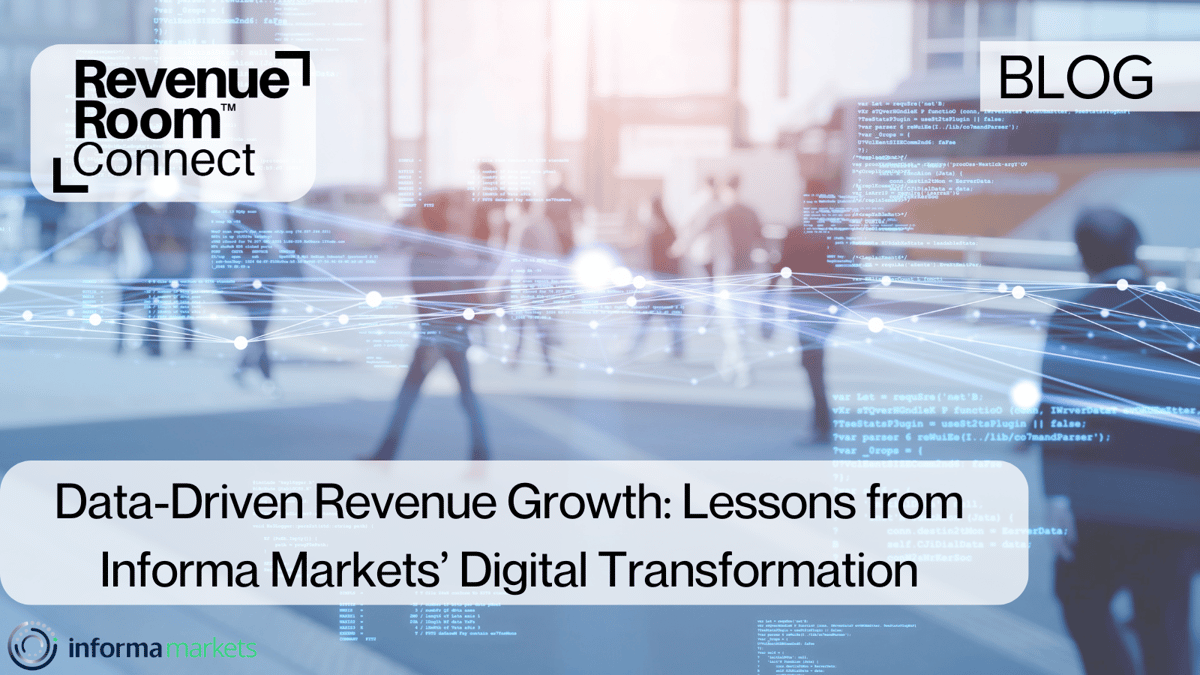Data-Driven Revenue Growth: Lessons from Informa Markets' Digital Transformation
In today's rapidly evolving business landscape, data-driven decision making isn't just an advantage – it's a necessity. A recent conversation with Denise Medved, Chief Commercial Officer of Informa Markets, one of the world's largest event organizers, revealed powerful insights into how traditional event businesses can successfully navigate digital transformation. Here's an inside look at how Informa Markets is revolutionizing its approach to revenue growth through data.
The Challenge: Transforming a Legacy Business
Informa Markets faced a common challenge in the events industry: how to modernize operations across a complex organization built through numerous acquisitions. Each business unit came with its own technology stack, processes, and organizational culture. The stakes were high – with over 70 properties spread across five different Salesforce instances, any transformation would need to be both comprehensive and carefully managed.
Building the Foundation: Data Unification and Standardization
From Fragmented to Unified
The first crucial step in Informa's transformation was standardizing their data infrastructure. The team focused on creating consistency in their Salesforce opportunity object across all instances – a seemingly simple but fundamentally important change.
"We started with the basics," Medved explains. "Account names, close dates, stages, and dollar amounts needed to mean the same thing across every system. Without this foundation, any higher-level analysis would be meaningless."
Key Implementation Steps:
- Identify core data elements crucial for business operations
- Establish standardized definitions and processes
- Create consistent reporting frameworks
- Implement data quality monitoring systems
Driving Cultural Change: The Human Side of Digital Transformation
Perhaps the most challenging aspect of any digital transformation isn't the technology – it's the people. With CRM adoption hovering around 50%, Informa needed to fundamentally change how their sales teams worked.
Successful Change Management Strategies:
- Start with Why: Clear communication about the benefits of new systems and processes
- Demonstrate Value: Show tangible ways data insights help close deals faster
- Provide Support: Continuous training and resources for team members
- Celebrate Wins: Regular recognition of successful adoption and results
Innovation in Talent Management
One of the most interesting aspects of Informa's transformation was their innovative approach to talent analytics. Using Talogy assessments, they gained deep insights into their sales team's natural strengths and motivations.
Impact of Talent Analytics:
- Optimized team structures based on individual strengths
- Better alignment of roles with natural abilities
- More effective hiring and development strategies
- Improved job satisfaction and performance
Revenue Optimization Through Data Analysis
The transformation extended beyond just operational efficiency. Informa implemented a sophisticated analysis of their sponsorship inventory across North American events, revealing significant revenue opportunities.
Key Revenue Optimization Strategies:
- Comprehensive analysis of pricing models
- Assessment of margin performance across different products
- Evaluation of sell-through rates for sponsorship assets
- Development of targeted strategies for underutilized inventory
Leadership in the Data Age
The success of Informa's transformation highlighted the crucial role of data-literate leadership. As Medved notes, "In today's environment, executives need to understand both the potential and limitations of data. It's about asking the right questions and knowing how to use insights effectively."
Essential Leadership Capabilities:
- Understanding of data analytics fundamentals
- Ability to interpret and question data-driven insights
- Commitment to evidence-based decision making
- Balance of data insights with industry expertise
Looking Forward: The Future of Event Industry Transformation
Informa's journey offers valuable lessons for other organizations in the events industry and beyond. Their experience shows that successful digital transformation requires:
- A clear vision and strategy
- Strong foundation in data standardization
- Effective change management
- Investment in people and skills
- Commitment to continuous improvement
Key Takeaways for Industry Leaders
As you consider your own organization's digital transformation journey, consider these actionable steps:
- Start with Data Foundations: Ensure your basic data infrastructure is solid before pursuing advanced analytics
- Invest in People: Focus on training, support, and change management
- Think Holistically: Consider how transformation affects all aspects of your business
- Measure and Adapt: Regularly assess progress and adjust strategies as needed
- Lead by Example: Demonstrate commitment to data-driven decision-making at the leadership level
Conclusion
The events industry stands at a crucial juncture where traditional business models meet digital transformation. Informa Markets' experience shows that successful transformation is possible with the right combination of strategy, technology, and people-focused change management. As the industry continues to evolve, organizations that embrace data-driven decision-making while maintaining their core strengths will be best positioned for future success.



